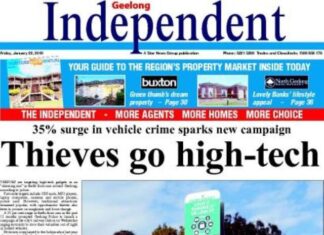Andrew Mathieson
GORDON Glen Denton Scholes stood at the gate of the Governor-General’s residence more than 30 years ago, waiting for his place in history to arrive.
It never came.
It’s now political folklore that on November 11, 1975, Australia’s Prime Minister Gough Whitlam was sacked after the Senate blocked supply to the Government’s money bills.
Whitlam first wanted to call a half-senate election but Sir John Kerr rejected his advice.
The House of Representatives later passed a motion of confidence in the Labor Government of the day and instructed Speaker of the House, Gordon Scholes, to relay the message.
But Kerr refused to meet the waiting Scholes, while all the time Liberal leader Malcolm Fraser had already signed the order to dissolve parliament.
“We had some difficulty in getting in,” Gordon nervously giggles.
“We were held up at the gate for some time actually.”
Gordon has taken his responsibility of conveying the resolution of the House very seriously under Section 46 of the Australian constitution.
In a letter, he later informed the Queen how improperly he thought Kerr had behaved.
He still keeps copies of all original letters, including the handwritten drafts.
But it’s that momentous delay in time that will forever remain in Gordon’s mind for more reasons than one.
“I didn’t even get back in time for Gough’s comments on the steps,” he now laughs.
Gordon retired from federal politics before the 1993 election.
He remarkably remained the Member for Corio for 26 years, winning 10 elections.
However, Gordon first won the seat in a by-election with a huge swing.
“I think it was something like six or seven per cent – I’m not entirely sure,” he recalls.
It was, in fact, closer to 11 per cent.
The modest 75-year-old then smiles, looks away to his left and points to his bookshelves.
“Yes, it’s all in the book,” referring to his own parliamentary records.
Gordon succeeded former Olympic cyclist Sir Hubert Opperman after 18 years to help regain the seat for the Labor Party.
Peaking at 60.1 per cent of the primary vote in 1983, he earlier just survived as a result of the Whitlam dismissal.
“On the last day there was about 27 votes to count – don’t hold me to those figures but it was something like that,” Gordon muses.
“And the Liberal scrutineers didn’t turn up.
“But the last handful we got were more than we lost.”
The end result was fortunately 31,322 votes to 31,302 in his favour.
Gordon once was a bike courier around the busy streets of Melbourne and worked at the woollen mills in Ballarat.
He first joined the railways in 1949, coming to Geelong as a driver.
“Virtually the whole of our family was associated with the railways on the Scholes side,” he tells.
His grandfather was one of the first stationmasters at Little River and Lara, and the last at Jolimont next to the MCG.
Joining Geelong Trades Hall as a drivers’ union delegate, Gordon almost accidentally stepped onto the political arena.
“One of those quirks of fate, I got elected to the executive on the first night I was at Trades Hall,” he grins.
“Someone put a ticket together and they voted for me because they didn’t know who I was.”
The former Trades Hall president joined the ALP in 1955 during the time of the split with Catholic members.
“The driver I was with was a keen Labor Party supporter and he sold me the ticket before sniggering, and that cost me four shillings.”
But the true measure of his status came after Whitlam attended a reception at Geelong West Town Hall on the eve of the 1993 election.
Gordon was incensed, at the time, of the threat of a GST on funerals.
Gathering with his successor Gavan O’Connor for a walk outside, Whitlam turned to both and said: “Well, Gordon, you and I will not have to worry about that – there will be no GST on state funerals.”
Speaker that wasn’t heard
Digital Edition
Subscribe
Get an all ACCESS PASS to the News and your Digital Edition with an online subscription
From the archives
16 years ago
22 January, 2010
Thieves are targeting high-tech gadgets in an “alarming rise” in thefts from cars around Geelong, according to police.
Favourite targets include...








